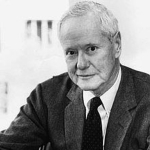Background
William J. Goode was born on August 30, 1917, in Houston, Texas, United States. He was the son of William J. and Lillian Rosalie Goode. He has a sister, Rosalie Grizzle.

Austin, TX 78712, United States
In 1938 William J. Goode received a Bachelor of Arts degree from the University of Texas at Austin. In 1939 he obtained a Master of Arts degree from this university.
State College, PA 16801, United States
In 1946 William J. Goode gained a Doctor of Philosophy degree from Pennsylvania State University.





(Examines trends in divorce worldwide, analyzing informati...)
Examines trends in divorce worldwide, analyzing information on Asian and Arab countries, Latin America, Western Europe, and the Anglo countries. Topics include the rise in cohabitation; the relation between divorce and such factors as age and class; and the problems caused by divorce.
http://www.amazon.com/gp/product/0300055374/?tag=2022091-20
1993
William J. Goode was born on August 30, 1917, in Houston, Texas, United States. He was the son of William J. and Lillian Rosalie Goode. He has a sister, Rosalie Grizzle.
In 1938 William J. Goode received a Bachelor of Arts degree from the University of Texas at Austin. In 1939 he obtained a Master of Arts degree from this university. In 1946 he gained a Doctor of Philosophy degree from Pennsylvania State University.
William J. Goode was enlisted in the Navy and became a radarman on an attack transport ship carrying and landing troops in the Pacific (1944 to 1945). From 1946 to 1950 he became an assistant professor in sociology at Wayne State University. He moved to Columbia University in 1950 to collaborate with Robert K. Merton on a project analyzing the professions in American society. In 1952, he became an associate professor and in 1956, a professor of sociology.
Goode was named the Franklin H. Giddings Professor of Sociology at Columbia University in 1975. He was chair of the Department of Sociology for several periods in the 1960s and 1970s and also served as the associate director of the Bureau of Applied Social Research and on its Board of Governors from 1956 to 1970.
In 1977, Goode left Columbia to become a professor of sociology at Stanford University where he taught for the next nine years. He became an emeritus professor at Stanford in 1986 and joined the Department of Sociology at Harvard University (until 1991). He was also a visiting professor at the Hebrew University of Jerusalem in 1991 and 1992. He became the Robinson Professor of Sociology and Law at George Mason University in 1994.
A former president of the American Sociological Association, Goode wrote on a variety of topics but was especially recognized for his books about the sociology of divorce and the family, including After Divorce (1956; reprinted as Women in Divorce, 1965), The Family (1964; second edition, 1982), Social Systems and Family Patterns: A Propositional Inventory (1971), and World Changes in Divorce Patterns (1993); he also edited and contributed to numerous sociology publications.
William J. Goode was one of the outstanding sociologists of his generation, he made fundamental contributions to understanding a broad array of behavioral and social phenomena. He was most famous for reinventing, reinvigorating, and reshaping the sociological study of the family. Goode was best known for his 1963 book, World Revolution and Family Patterns. His work, Methods in Social Research, was widely translated and was used to teach research methods to three generations of social scientists throughout the western world and Asia.
He was honored by numerous awards and prizes, including an honorary Doctorate of Science from Upsala College in 1971; the Merit Award for a Lifetime of Scholarship from the Eastern Sociological Association; two Guggenheim fellowships, etc. In 1982, in honor of his work, the American Sociological Association named a book award after him.
(Examines trends in divorce worldwide, analyzing informati...)
1993William J. Goode was a fellow of the American Academy of Arts and Sciences.
William J. Goode was an intensely engaged amateur painter and sculptor, a gardener, a gourmet chef to who's cooking the New York Times once devoted a whole page, a mycologist, and a birder who published articles on both in naturalist journals, a sailor, a scuba diver. Enthusiastic, almost fanatical, about fitness, he medaled in senior tournaments in downhill skiing and tennis into his 80s. Retirement only extended the range of his interests - he was studying Hebrew in his 80s, hiking in Tuscany, and Galapagos at 85.
Goode was a passionate conversationalist, gay, witty, warm, sparkling; like everything else he did, full of zest, vitality, vigor, and a contagious joie de vivre. He was endlessly insightful, he made you more insightful. He was probing, questioning, doubting, ironic, irreverent, iconoclastic, a wildly adventurous thinker with quirky originality, a different way of looking at things, sought out by students and colleagues alike because of the difference in his way of looking at things made you yourself look at things in new ways. But his conversation was also an exercise in a rigorous critique. He was always gracious but never allowed politesse to interfere with the criticism of fuzzy thought, whether yours or his own.
William J. Goode was married three times. His marriages to Josephine Cannizzo and Ruth Rosenbaum ended in divorce. His third wife was Lenore J. Weitzman. Goode had three children: Erich, Andrew Josiah, Barbara.

